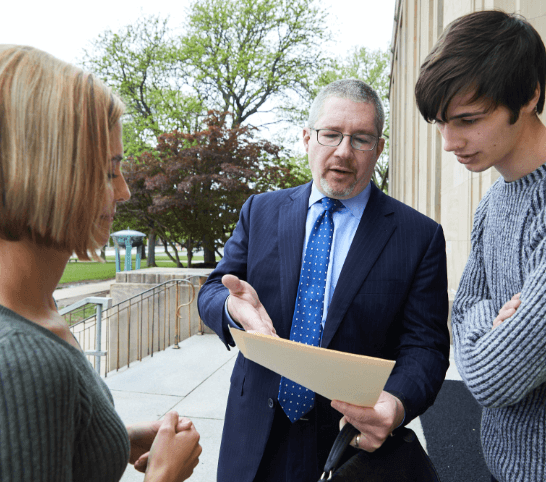Disrupting Court Proceedings or Violating a Court Order
What is Criminal Contempt in the Second Degree?
Criminal contempt in the second degree refers to a variety of disruptions to the normal workings of a court. This can include disrupting a court proceeding such as a trial, but it also applies to court orders and representations of proceedings.
When the Charge of Criminal Contempt in the Second Degree Applies
If you watch courtroom dramas on television, you may be familiar with scenes of judges “holding in contempt” some lawyer or other person who is disrespectful or disruptive in the courtroom. In reality, these cases are a relatively small portion of the cases of criminal contempt in the second degree. Far more common are cases of people violating orders of protection that have been put in place to safeguard individuals who have been injured or threatened by someone. In these instances, a person is charged with criminal contempt in the second degree when they do something prohibited by a restraining order (such as visiting the house of or making calls to someone they’re not allowed to contact).
Second degree criminal contempt also applies to representations of court proceedings. Namely, the law makes it a criminal act to knowingly publish lies or misrepresentations of what happens in a courtroom. In addition, it requires individuals to answer questions when called as a witness in a court, and to follow the legal guidelines for serving as a juror.
NY PENAL § 215.50: Criminal Contempt in the Second Degree
New York State’s penal code says:
A person is guilty of criminal contempt in the second degree when he engages in any of the following conduct:
1. Disorderly, contemptuous, or insolent behavior, committed during the sitting of a court, in its immediate view and presence and directly tending to interrupt its proceedings or to impair the respect due to its authority; or
2. Breach of the peace, noise, or other disturbance, directly tending to interrupt a court’s proceedings; or
3. Intentional disobedience or resistance to the lawful process or other mandate of a court except in cases involving or growing out of labor disputes as defined by subdivision two of section seven hundred fifty-three-a of the judiciary law; or
4. Contumacious and unlawful refusal to be sworn as a witness in any court proceeding or, after being sworn, to answer any legal and proper interrogatory; or
5. Knowingly publishing a false or grossly inaccurate report of a court’s proceedings; or
6. Intentional failure to obey any mandate, process or notice, issued pursuant to articles sixteen, seventeen, eighteen, or eighteen-a of the judiciary law, or to rules adopted pursuant to any such statute or to any special statute establishing commissioners of jurors and prescribing their duties or who refuses to be sworn as provided therein; or
7. On or along a public street or sidewalk within a radius of two hundred feet of any building established as a courthouse, he calls aloud, shouts, holds or displays placards or signs containing written or printed matter, concerning the conduct of a trial being held in such courthouse or the character of the court or jury engaged in such trial or calling for or demanding any specified action or determination by such court or jury in connection with such trial.
Criminal contempt in the second degree is a class A misdemeanor.
What can happen to me if I am charged with Criminal Contempt in the Second Degree?
Although Criminal Contempt in the Second Degree is a misdemeanor, you can still face substantial consequences if you are convicted of it. You can be sentenced to a prison term of up to a year, but even if you are not sentenced to jail time, you can face probation, community service, or a fine. In addition, your immigration status may be affected. Therefore, it is important that you hire an experienced criminal defense attorney who understands the statutes and can put together an effective defense for you. For instance, your lawyer may prove that you did not intend to violate an order of protection, which is a component of Criminal Contempt in the Second Degree. Regardless of your circumstances, you should take the charge seriously and hire a lawyer as soon as possible.
What Should I Do Next?
If you are charged with Criminal Contempt in the Second Degree in Nassau, Queens, or Suffolk County, it is important that you hire an experienced criminal defense attorney immediately. Your defense lawyer will speak on your behalf to police, prosecutors, and the court. He can help you to understand your options and put together the best case to achieve a positive outcome for you. Don’t try to deal with the law yourself; let your New York criminal defense lawyer work on your behalf.
